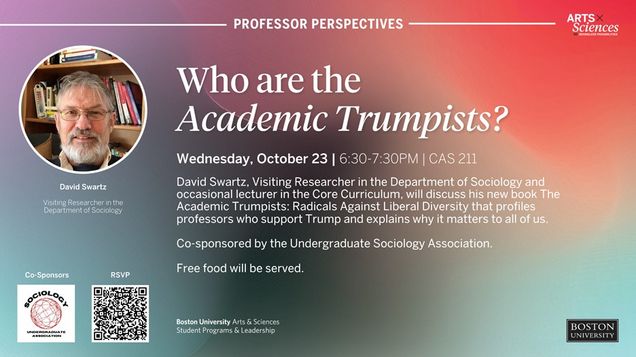David Swartz Sheds Light on Professors for Trump: TWO Events (10/23 and 10/30)
BU sociologist David Swartz will discuss his new book The Academic Trumpists: Radicals Against Liberal Diversity at TWO campus events: one on Wednesday October 23 from 6:30-7:30 pm in CAS 211, and a second on Wednesday October 30 from 4-6 pm in the CISS conference room. Read below and catch one of the two exciting opportunities to learn about David’s fascinating work!
Wednesday, October 23 | 6:30-7:30pm | CAS 211
Professor Perspectives: Who are the Academic Trumpists?

David Swartz, Visiting Researcher in the Department of Sociology and occasional lecturer in the Core Curriculum, will discuss his new book The Academic Trumpists: Radicals Against Liberal Diversity that profiles professors who support Trump and explains why it matters to all of us.
Free food will be served.
RSVP here
******
Wednesday, October 30 | 4-6pm | CISS 5th floor conference room
Sociology Department Panel Discussion: Who are the Academic Trumpists?

The BU Sociology Department invites you to a panel discussion on David Swartz’s new book The Academic Trumpists: Radicals Against Liberal Diversity. The panel features:
- David Swartz, BU Sociology
- Steven Brint, UC Riverside (via Zoom)
- Peter Kivisto, Augustana College (via Zoom)
- Moderated by Alya Guseva, BU Sociology
The Academic Trumpists addresses a gap in the research literature by looking at the impact of Trumpism on conservative faculty. It compares 109 professors who publicly support Trump to 89 conservative professors who oppose Trump. All 198 function as public intellectuals who advocated publicly their views.
Drawing on recent research in the sociology of intellectuals and Pierre Bourdieu’s analytical field perspective, this book offers a fielding political identities and practices framework to show how these two groups of professors (Trumpists and anti-Trumpists) differ in where they teach, their intellectual orientations, their scholarly productivity, their political rationales, where they network with think tanks, scholarly professional associations, and government agencies, and their stances on key controversies surrounding the Trump presidency (Covid-19, the two impeachments, the November 2020 election lost, and the January 6 mob assault on the United States Capitol). The academic Trumpists embrace the right-wing populist wave mobilized by Trump and the conservative critics resist this move. This polarization of views between these two groups of conservative professors is enduring and rooted in two distinct social networks that connect their positions in the academic field to affiliations with conservative think tanks that reinforce their respective political identities and radical right-wing anti-establishment thinking in America more generally.